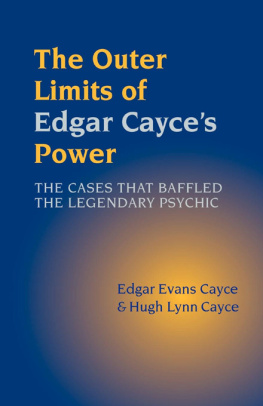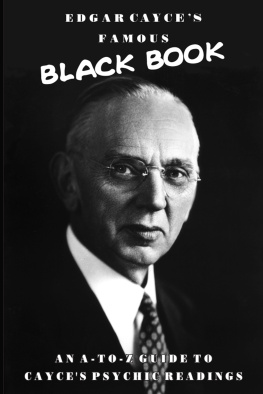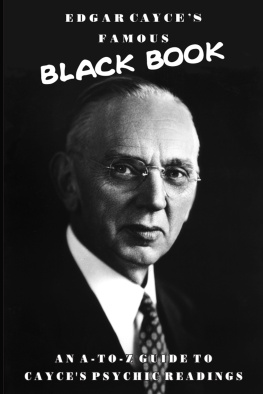
Edgar Cayce on
Angels and the Angelic Forces
Selected Books by Kevin J. Todeschi
Edgar Cayce on Angels and the Angelic Forces
Kevin J. Todeschi, MA
Non-Fiction
The Best Dream Book Ever
Contemporary Cayce (co-author)
Divine Encounters
Dreams, Images and Symbols
Edgar Cayces ESP
Edgar Cayce on the Akashic Records
Edgar Cayce on Auras & Colors (co-author)
Edgar Cayce on Mastering Your Spiritual Growth
Edgar Cayce on Reincarnation and Family Karma
Edgar Cayce on Soul Mates
Edgar Cayce on Soul Symbolism
Edgar Cayce on Vibrations
Edgar Cayces Twelve Lessons in Personal Spirituality
Fiction
A Persian Tale
The Reincarnation of Clara
The Rest of the Noah Story
Edgar Cayce on
Angels and the Angelic Forces
Kevin J. Todeschi, MA
A.R.E. PressVirginia BeachVirginia
Copyright 2019
by Kevin J. Todeschi, MA
1st Printing, February 2019
Printed in the U.S.A.
All rights reserved. No part of this book may be reproduced or transmitted in any form or by any means, electronic or mechanical, including photocopying, recording, or by any information storage and retrieval system, without permission in writing from the publisher.
A.R.E. Press
215 67th Street
Virginia Beach, VA 23451-2061
ISBN-13: 978-0-87604-973-0
All biblical quotes come from the King James Version of the Bible.
Edgar Cayce Readings 1971, 1993-2007
by the Edgar Cayce Foundation.
All rights reserved.
Cover design by Christine Fulcher
Be not forgetful to entertain strangers: for thereby some have entertained angels unawares.
Hebrews 13:2
Contents

Preface
A Brief History of Angels
Just what are guardian angels, archangels, and divine messengers? Even the words can produce comfort, reassurance, and hope, for they suggest the presence of celestial beings who have concern for humankind and are somehow involved with the lives and activities of all individuals. Are these emissaries of light spiritual beings that come directly from God? Are they somehow responsible for bringing information, guidance, and even a healing presence into peoples lives? Were angels only a part of the spiritual history of the past, or do they continue to maintain an interaction with humans even now? Are there both good angels and fallen angels? What role do they play in the earth? Just who and what are these divine creatures?
The word angel comes from the Greek word angelos, which means messenger. According to the Greek philosopher Plato (ca. 427-347 BC), from birth each human soul has the capacity to be guided by a portion of its divine or higher self. This divine influence might also be perceived as individualized lesser gods, messengers, and daemons. These lesser gods and daemons are the intermediaries between Zeus and the world of mortals. They are charged with helping the human creature return to its divine origins. When an individual soul follows the positive aspects of these divine influences, that soul is nourished and grows closer to the heavenly realms; when it does not, it may too easily fall sway to ugliness and evil, experiencing digression in the process. In the words of Platos Phaedrus, the process is described, as follows:
Now by these excellences especially is the souls plumage nourished and fostered, while by their opposites, even by ugliness and evil, it is wasted and destroyed. And behold, there in the heaven Zeus, mighty leader, drives his winged team. First of the host of gods and daemons he proceeds, ordering all things and caring therefor, and the host follows after him
Phaedrus 246e-247a
Jewish mysticism suggests that aspects of angel lore can be traced back to both the Babylonians and the Persians. In fact, the Persian faith of Zoroastrianism details the existence of both archangels and a personal guardian angel, called a Fravashi, which is essentially the personal spirit guide for every single soul. Another similarity is that the Persian destructive spirit, Ahriman, possesses similarities to the fallen angel, Lucifer. Depending upon ones interpretation, the first mention of an angel in Judeo-Christian scriptures may be related to a fallen angel taking the form of a serpent and tempting Eve to eat the fruit of a forbidden tree, resulting in Adam and Eve being evicted from the Garden of Eden:
Now the serpent was more subtil than any beast of the field which the Lord God had made. And he said unto the woman, Yea, hath God said, Ye shall not eat of every tree of the garden?
And the woman said unto the serpent, We may eat of the fruit of the trees of the garden:
But of the fruit of the tree which is in the midst of the garden, God hath said, Ye shall not eat of it, neither shall ye touch it, lest ye die.
And the serpent said unto the woman, Ye shall not surely die:
Gen. 3:1-4
Later within the same chapter, we find the first mention of benevolent angels in the form of Cherubim (the most frequently mentioned type of angel), who are asked to stand guard to prevent Adam and Eve from returning to the Garden:
Therefore the Lord God sent him forth from the garden of Eden, to till the ground from whence he was taken.
So he drove out the man; and he placed at the east of the garden of Eden Cherubims, and a flaming sword which turned every way, to keep the way of the tree of life.
Gen. 3:23-24
According to the interpretation of some, fallen angels actually make their second appearance after the Flood when they become physically tempted by the beauty of some of Noahs descendants, as is illustrated by: the sons of God saw the daughters of men that they were fair; and they took them wives of all which they chose. (Gen. 6:2)
Setting aside these earliest references in Genesis, the first mention of an angelic messenger in scripture occurs in Genesis 16. According to the tale, Abram and Sarai were aged and had never been able to conceive children. Feeling sorry for her husbands lack of progeny, Sarai gave him her younger Egyptian handmaid, Hagar, with whom to conceive. Unfortunately for Hagar, when the younger woman became pregnant, Sarai became angry and treated her harshly, causing Hagar to flee the household. It was while she was resting at a desert spring that an angel of the Lord appeared to her, encouraged her to return home, and correctly prophesied that she would conceive a son and name him Ishmael.
Soon after Sarai and Abram had been renamed by God as Sarah and Abraham, three angels disguised as mortal men made an appearance and correctly predicted that the elderly couple would soon have a son of their own and name him Isaac. (Gen. 18) In fact, Abraham was told by an angelic messenger that God had ordained his descendants to become as numerous as the stars of the heaven, and as the sand which is upon the sea shore. (Gen. 22:17) The prophecy became realized in that the religions of Judaism, Islam, and Christianity all trace their roots to Abrahamperhaps explaining, in part, the similarities in angelology among these three faiths.
Next page












